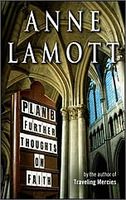Anne Lamott :: Plan B
 I first read Anne Lamott in one of her columns for Salon.com. That article--called "Advent 2003,"-- is about Advent, imperfect families being together with grit and kindness, and hope for the light. (The article is available free online, but requires temporary registration with Salon.com to access.) She's Christian and liberal and funny and challenging. She's both reverant and irreverant, saying things like, "Having a good dog is the closest some of us are ever going to come to knowing the direct love of a mother, or God, . . ." (from "This Dog's Life").
I first read Anne Lamott in one of her columns for Salon.com. That article--called "Advent 2003,"-- is about Advent, imperfect families being together with grit and kindness, and hope for the light. (The article is available free online, but requires temporary registration with Salon.com to access.) She's Christian and liberal and funny and challenging. She's both reverant and irreverant, saying things like, "Having a good dog is the closest some of us are ever going to come to knowing the direct love of a mother, or God, . . ." (from "This Dog's Life").
Now Lamott has a new book called Plan B: Further Thoughts on Faith; it follows a previous book titled Traveling Mercies: Some Thoughts on Faith. In Plan B, she talks about being 50, having a teenaged son, politics, and faith. You can read "Diamond Heart," an excerpt from the book in which she talks about her sometimes ambivalent feelings about her son. Here's a sample:
I asked a friend of mine who practices a spiritual path called Diamond Heart to explain the name recently, because I instinctively know that Sam [Lamott's son] and I both have, or are, diamond hearts. My friend said our hearts are like diamonds because they have the capacity to express divine light, which is love; we are not only portals for this love, but are actually made of it. She says we are made of light, our hearts faceted and shining, and I absolutely believe this, to a point: Where I disagree is when she says we are beings of light wrapped in bodies that only seem dense and ponderous, but are actually made of atoms and molecules, with infinite space and light in between them. It must be easy for her to believe this, as she is thin, and does not have children. But I can meet her halfway: I think we are diamond hearts, wrapped in meatballs.Warning: The Bush administration really depresses Lamott and she cusses a lot.

 The Presbyterian Church (USA) publication
The Presbyterian Church (USA) publication 
